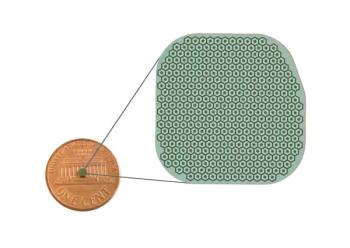
- Vol. 10 No. 07
- Volume 10
- Issue 7
Marta C. Fabrykowski, OD, FAAO-Manhattan Eye, Ear, and Throat Hospital in New York City
Marta C. Fabrykowski, OD, FAAO, discusses impacts on health care, MBA at Yale, and slow cooking in the latest Optometry Times Q&A.
Where did you grow up?
In Winnipeg Canada. My parents are both professors. My father was a number theory and calculus professor; he was the director of the United States Math Olympiad Team. My mother is an early childhood education professor.
How did you get from art history to ocular disease?
I always knew I wanted to go in to healthcare, I just didn’t love the idea of biology or physics. I preferred to take classes in something I could use conversationally with patients. In examining a patient, of course you use basic science, but you also are a person and talk to them about what they like to do. I knew I would be in a major metropolitan area and I really love art history, so it was a great merger.
What about research keeps you engaged?
The best approach for me is the best up-to-date on current strategies and standards of care. It’s important see what other people are doing and how to improve it. Staying current in research can keep you the most up to date for your treatment of patients. Patients are very well versed in their care. They are advocates for themselves, so it’s good to know what they’re reading so you can explain what they have seen.
Why ocular disease?
I interact with people across the whole spectrum of health care: rheumatologists, internists, oncologists. We send cultures to labs, so I speak with lab technicians or PhDs doing research on some bacteria we happened to send a sample of. It’s fascinating because it becomes a multifaceted approach which is where eye care is trending, and ODs are networking with primary-care doctors. But when you’re dealing with disease, your focus is to talk to other practitioners and get a holistic version of the person.
Previous Q&A:
Why a hospital practice instead of private practice or industry?
The hospital where I work is nonprofit, so that is vital. I always wanted to make an impact on health care in a way that enabled me to see patients in all walks of life, whether they’re on Medicaid and uninsured or an Upper East Sider with a lot of insurance. I see patients from over the whole spectrum. Practitioners are salaried in the hospital, so there’s less incentive for fee-for-service. If you are in a private practice, you take home what you bring in. Being in a hospital allows me to focus on patient care. I don’t need to think about billing, marketing, or my schedule. We have departments that take care of that. I’m able to see my patients and then go home; the day-to-day things I don’t need to worry about. Working in a hospital, I work with other specialists: cornea, medical and surgical retina, neuro-ophthalmology, glaucoma. Being in a hospital allows me interaction with all those special branches.
What’s something your colleagues don’t know about you?
How much I like to cook and how much I like to cook for a long time. Those recipes that say 6+ hours of preparation or 3+ hours of marinating plus 12 hours in a cooker. I like to dive into those and mix my own spice concoction. I’m efficient in the office, so it’s an opposite hobby that’s something low and slow.
Where do you see yourself in 10 years?
Hopefully with my optometry school debt paid off. [Laughs] I hope to make a large impact on non-profit health care and optometry/ophthalmology eye world. I’m seeing one patient at a time, and I’m talking to him about his insurance woes, medications that aren’t covered, and how long it took to see me. I listen to this day-in, day-out, and I’m thinking wouldn’t it be great if I could make larger decisions. What if there was a way I could call an insurance company and help make a decision that would help 100 patients or 1,000 patients. So, I hope my impact in 10 years is on making large brushstrokes and larger impact on health care.
Why an MBA from Yale?
In order to functionally lead or make an impact in business, you have to understand business. You have to understand operations, funding, and the structure of different companies. I don’t know that well enough to make use of that knowledge and to make decisions. I can identify trends, but how does that impact health care, the business of health care, and the business of insurance? So, to move forward with being able to make a larger impact, I need much greater understanding. Yale is close to New York City. Because it is an executive MBA, it allows me to stay at the hospital full time. It is important to me to be able to stay in my current job to innovate while here. Health care is such a fluctuating and growing behemoth that being at work while learning is integral.
What would you advise a young OD who wants to follow your path?
My path is evolving. If their path is to work in a hospital and in ocular disease, I would say keep your interests in doing a residency. I became a Fellow of the American Academy of Optometry the year I finished residency, which was helpful for networking, so I recommend becoming a Fellow. If it’s business-oriented things or healthcare on the whole, an MBA and other graduate programs will get you in that arena.
What’s your guilty pleasure food?
What I feel guilty about is that I don’t ever feel guilty about eating something. My mom taught us that whatever you feel like eating is probably what your body needs. I eat very healthy in moderation, most things. Maybe as I get older and my metabolism slows down, I’ll have a different view and start feeling more remorseful. [Laughs]
Related Q&A:
What’s something about optometry you’d like to change?
Can I say tuition costs? [Laughs] I had such a great experience at Ohio State. They integrated us with pharmacy and held mixers with other schools-it is important for professional schools to network with other healthcare providers. Maybe more interaction with more healthcare specialties while in school to build those foundational relationships. For example, we work closely with ENT here. We have patients who complain of eye pain in the area of the eye that ends up being a sinus problem. So, more interaction with the whole-body specialties would be helpful.
Do you have any regrets?
Like being 13 and not making the basketball team because I had no hand-eye coordination? [Laughs] Never doing a sport or being part of a dance team or anything. It is character building, and if you enjoy that in childhood you’re more apt to do that later as an adult. I never really did that, which explain why I don’t do it now. Athletics is something I would have changed. [Laughs]
What’s the craziest thing you’ve ever done?
Accepting this job. I was in a fantastic ocular disease residency. Near the end of the residency, I spoke with our glaucoma specialist about job interviews, and he said “Let me make a few calls.” He called to say, “I have a job for you, this is where you will go for your interview and tell them you want the job.” I had no good options, so I came to the hospital and the office was not built. I was given a hardhat, and they walked me through this area with only beams and plywood. I said yes without seeing a practice and with meeting a only few of the doctors. I’m a risk-adverse person, but it was the first time I took a leap of faith and it worked out. Still here, my first and only job!
Articles in this issue
over 7 years ago
GPC leads to contact lens instabilityover 7 years ago
Eyelid taping may offer temporary alternative to blepharoplastyover 7 years ago
Resveratrol may be key in AMD stroke patient treatmentsover 7 years ago
Peroxide lens care effective for GP lens wearersover 7 years ago
Use MIGS prior to late-stage glaucomaover 7 years ago
Why documenting target IOP helps ODsover 7 years ago
Demand for optometry projected to growover 7 years ago
4 tips to help staff identify contact lens candidatesabout 8 years ago
3 tips to upgrading astigmatic contact lens patientsNewsletter
Want more insights like this? Subscribe to Optometry Times and get clinical pearls and practice tips delivered straight to your inbox.





























